*This post is the sixth installment in a series that looks at the NCAA men’s ice hockey national champions, beginning with the 1940s. Here are the decades that have already been covered:
- NCAA Hockey National Championship History: The 1940s & 1950s
- NCAA Hockey National Championship History: The 1960s
- NCAA Hockey National Championship History: The 1970s
- NCAA Hockey National Championship History: The 1980s
- NCAA Hockey National Championship History: The 1990s
Since the initial NCAA tournament in Colorado Springs in 1948, 72 programs have been crowned the best team in college hockey in the United States. Some have won more than others, but all are proud to be champions, even if it was only once.
At the turn of the new millennium, college hockey’s popularity was heading to new heights. National coverage, a TV-deal with ESPN, the game was more widespread than ever before. As for the on-ice product, the decade saw the returns of dynasties from the WCHA, and a long drought finally ending.
2000: University of North Dakota
After winning the school’s sixth national championship in 1997, the Fighting Sioux continued to build behind head coach Dean Blais. In the 1999-00 season, North Dakota would be one of the top teams, once again, in the NCAA.
Related: 1974-75, the Capitals’ First (and Worst) Season
The Fighting Sioux went an impressive 27-8-5 in the regular season but finished second in the WCHA after finishing with a 17-6-5 record in conference play. Offensively, the Sioux were led by First-Team All-American Jeff Panzer and Second-Team All-American Lee Goren. The pair finished third and fourth, respectively, in the NCAA in points with Panzer scoring 65 to Goren’s 63.
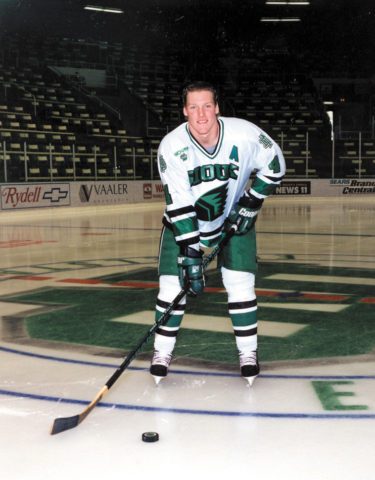
North Dakota went on to win the WCHA Tournament, earning a bye into the quarterfinals of the National Tournament. After knocking off Niagara in the regional final and defeating Maine in the semifinal, North Dakota would meet Boston College in the championship game. The Eagles were making their second championship game appearance in three years and were leading 2-1 heading into the third period. However, North Dakota would score three unanswered in the final frame, two coming from Goren, to win their second title in four years by a final score of 4-2.
2001: Boston College
The Boston College Eagles won the second NCAA National Championship ever in 1949. 52 years later, they were still looking for that second championship, coming close in 1965, 1978, 1998 and the spring prior to the 2000-01 season.
Still, the Eagles put together another outstanding regular season. The team went 25-8 in the regular season, easily clinching the top spot in Hockey East. BC boasted three All-Americans with defenceman Bobby Allen and forwards Brian Gionta (First-Team) and Krys Kolanos (Second-Team). Captain Gionta ended up leading the Eagles’ attack with 33 goals and 54 points.
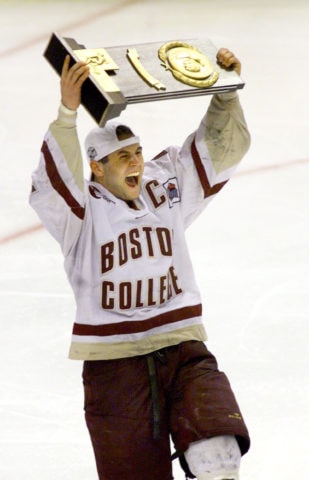
Boston College won their fifth Hockey East Championship, earning a bye into the second round of the national tournament. There, they would defeat conference-rival Maine, and followed that up with a win over Michigan, avenging their loss to the Wolverines from 1998.
This setup a rematch of the 2000 final against North Dakota, who still boasted a lot of their roster from the year before. (from ‘HOCKEY: N.C.A.A. FROZEN FOUR; Eagles and Fighting Sioux Will Meet Again in the Final,’ New York Times, 04/01/2001). The Eagles had the lead again heading into the third period, this time up by two. Still, the Sioux came back to tie the game with less than a minute remaining, sending the game to overtime.
BC was not about to suffer a repeat letdown, and just a few minutes into overtime, Kolanos scored to give Boston College their first title in 52 years.
The win was also memorable in the fact that Boston College had gone through the last three national champions in North Dakota (1997 and 2000), Michigan (1996 and 1998) and Maine (1999) en route to the championship.
2002: University of Minnesota
Even though it had not been nearly as long of a drought that Boston College had suffered, the Minnesota Golden Gophers had not won a championship since Herb Brooks’ left to coach the 1980 U.S. Olympic Team.
In the 2001-02 season, the Gophers went on to have another great regular season, having one of the best records in college hockey going 28-8-4, but somehow finished third in the WCHA behind St. Cloud State and Denver. That said, the Gophers possessed a stacked lineup, including All-American John Pohl, and Hobey Baker-winner Jordan Leopold. Leopold finished third on the team points, scoring 48 points in 44 games.
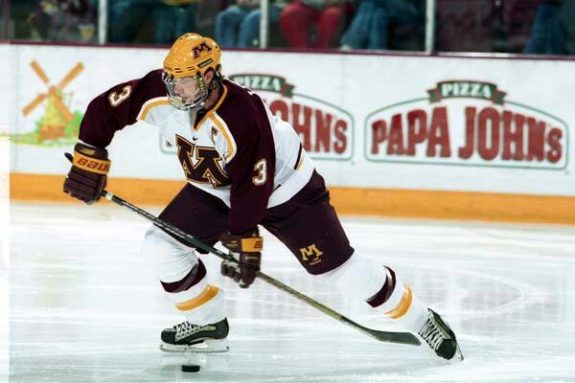
After losing in the WCHA Tournament, the Gophers still were given a bye to the quarterfinals. There, they slid by Colorado College before defeating Michigan to make it to their first final since 1989. Minnesota met Maine in the championship game, and it proved to be another classic in the Gophers’ backyard at the Xcel Energy Center in St. Paul.
The teams traded goals throughout the contest, with the Black Bears carrying a 3-2 lead into the final minute of regulation. Matt Koalska scored for the Gophers to even the score, and for the fifth time in seven years, the championship game needed extra time. With less than five minutes remaining in the first overtime, Grant Potulny found a loose puck in front of the Maine goal, and slid it into the back of the net give the Gophers their first championship since 1979.
2003: University of Minnesota
Even though winning in 2002 was nice, Minnesota was hungry for another championship heading into the 2002-03 season. With a lot of returning talent on their roster, it looked they had a pretty good chance to repeat.
Related: 7 Cool Things About Johnny Gaudreau
Minnesota ran through the regular season, going 20-8-9. However, their 15-6-7 record in conference play put them second in the WCHA standings. Thomas Vanek was the go-to guy for the Gophers that season, as he led the Gophers in points with 62, which was tied for tied for sixth in the country in scoring.
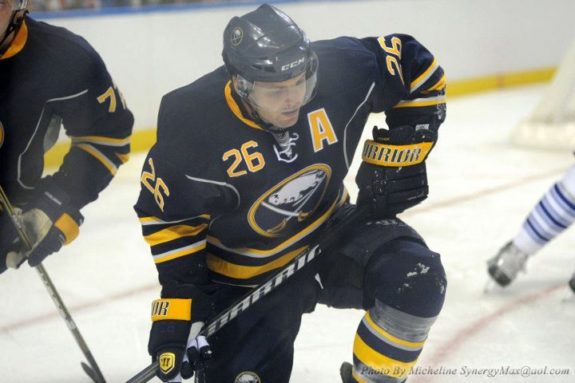
Minnesota went on to win their 12th WCHA Conference Championship, but would not earn a bye as 2003 marked the first year that the NCAA Tournament would feature a 16-team format, which they still use today. Minnesota won their way out of the West Regional after easily defeating both Mercyhurst and Ferris State.
In the Frozen Four, Minnesota had to go to overtime to defeat Michigan to make it back to the championship game, where they would meet New Hampshire. The Gophers, led by two late-third period goals from Barry Tallackson, went on to win another national championship, this time by a score of 5-1. Minnesota became the first school since Boston University in 1972 to win back-to-back titles.
2004: University of Denver
In 2004, the Denver Pioneers were set to celebrate the 35th anniversary of their 1969 National Championship team, the program’s last championship. Little did they know they were going to be honouring a new victor that spring.
The Pioneers missed the 2003 National Tournament after a tough season in the overly-competitive WCHA. In the 2003-04 season, the Pioneers returned to form after going 23-10-5. Defenceman Ryan Caldwell was the lone All-American that season for the Pioneers, with Gabe Gauthier leading the team with 43 points.
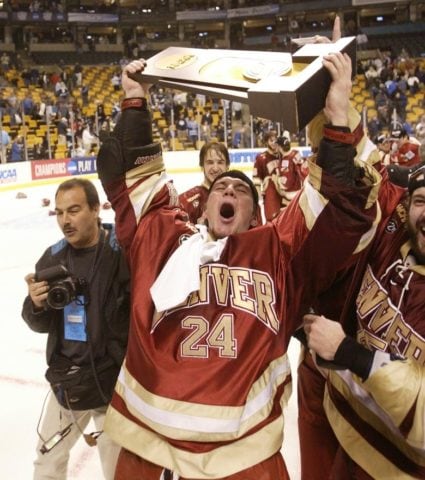
Despite not winning either of the WCHA Regular Season or Conference Championships, DU still earned a bid into the national tournament. After knocking off Miami University in the opening round, goaltender Adam Berkhoel posted a 33-save shutout to beat North Dakota to send DU to the Frozen Four.
After defeating Minnesota-Duluth, the Pioneers took on Maine, and Hockey East MVP Jimmy Howard, in the final. Gauthier scored in the first period, and Denver was tasked to hold that one-goal lead through the remainder of the game. With just over 90 seconds to go, Maine found themselves with a 5-on-3 power play, making it a three-man advantage after pulling Howard. Somehow, Berkhoel and the Pioneers shut the door, winning the program’s sixth national title.
2005: University of Denver
After the big win the year before, the Pioneers looked to become the second repeat champion of the decade. They certainly had a lot of talent up front, but the question remained in goal after Adam Berkhoel graduated after the 2003-04 season.
The tandem of Peter Mannino and Glenn Fisher clicked in net for DU, with Mannino being tabbed as 1A with the better numbers, posting a 2.25 goals-against-average (GAA) and a .922 save percentage (SV%). Gauthier once again led the offence, this time with 57 points, tied for third in the NCAA. Denver also possessed two of the best blueliners in the country, as Matt Carle earned First-Team All-American honours, while Brett Skinner was named Second-Team All-American.
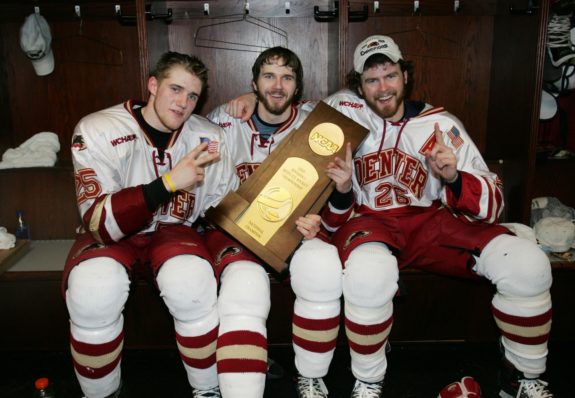
Denver’s 24-9-2 record placed them as the best team in the WCHA, and they won their first conference championship since 2002. Fisher started in goal for the Pioneers in their tournament opener against Bemidji State. Despite a shaky performance, Denver would win in overtime. Head coach George Gwozdecky chose to go with the freshman Mannino in the Northeast Regional Final, instead of staying with the veteran Fisher.
The decision paid dividends as Mannino backstopped the Pioneers to a win over New Hampshire, before making 41 stops in the team’s semifinal win over Colorado College. In the championship game, DU would go up against longtime rival North Dakota. The Fighting Sioux brutally outplayed the Pioneers, outshooting DU 45-24. Yet, Mannino only faltered once, and behind two goals from Paul Stastny, the Pioneers became back-to-back champs for the third time in school history with a 4-1 victory.
2006: University of Wisconsin
While Minnesota and Denver were taking care of business in the first half of the decade, the Wisconsin Badgers seemed to get lost in the shuffle in the WCHA, only making the national tournament once since 1992.
In the 2005-06 season, the Badgers started hotter than a firecracker, winning 18 of their first 24 games. The team cooled off, finishing the regular season 23-9-3, tying Denver for second in the conference. With Joe Pavelski leading the offence with 56 points (fourth in the country), Brian Elliott proved to be one of the best goaltenders in the NCAA. He led the country in wins (27), GAA (1.55) and SV% (.938).
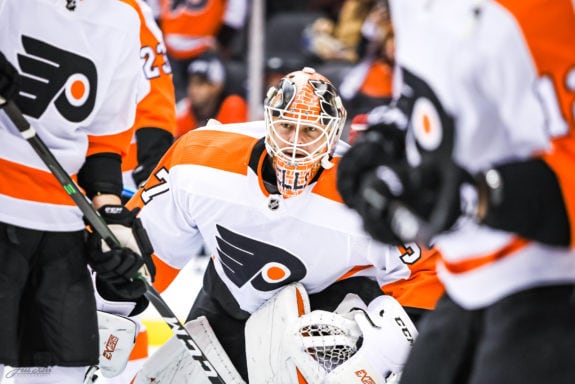
The Badgers ended up earning an at-large bid and would make their way to the Frozen Four after beating Bemidji State, then winning a 1-0 triple-overtime classic against Cornell. After ousting Maine, the Badgers met with Boston College in the final. The Eagles struck first in the opening period, but Robbie Earl’s tying goal in the second period and Tom Gilbert’s marker in the third proved to be just enough as Wisconsin went on to win their first national championship since 1990.
2007: Michigan State University
Despite the conference’s dominance in the ’90s, the CCHA had been winless in the Frozen Four since Michigan’s win in 1998. One of the best teams in the early part of the 2000s was Michigan State, but, despite having Hobey Baker-winning netminder Ryan Miller for three seasons, were unable to reach the top of the college hockey mountain.
Related: Two of the Cheapest NHL Trades Ever
The 2006-07 rendition of the Spartans was your typical middle-of-the-pack CCHA team, going 20-13-3 in the regular season, and finishing fourth in the conference standings. No skater eclipsed the 50-point mark, but the team’s true star stood in goal, all 5’6″ of him. Sophomore goaltender Jeff Lerg played in all but three games in the regular season, posting a 2.41 GAA and .913 SV%.
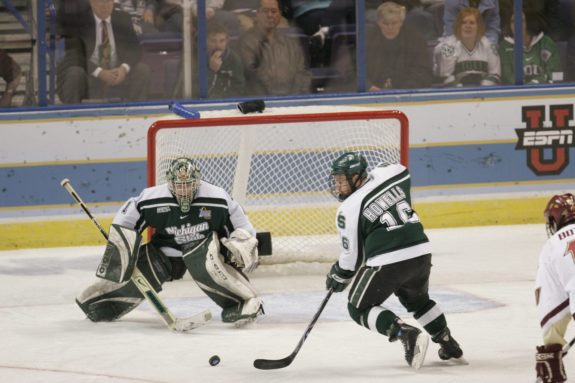
The Spartans made it all the way to CCHA Conference Semifinals, before falling to rival Michigan. They still earned an at-large bid into the tournament and turned heads after taking down Boston University and CCHA-champion Notre Dame in the Midwest Regional. After knocking off Maine in the semis, the Spartans took on Boston College to decide the championship.
Michigan State trailed heading into the third period but was able to rally after leading-scorer Tim Kennedy tied the game, and Lerg made a huge save on Brian Boyle. Then, with 18.9 seconds left, Justin Abdelkader scored to give MSU the lead, and they went on to win by a score of 3-1, earning the school its third national championship.
2008: Boston College
Even though the Eagles ended their half-century drought earlier in the decade, two consecutive losses in the final still stung the players at Boston College. At the beginning of the 2007-08 season, it looked like the window for a championship had passed, as the team started the regular season 3-4-5.
Yet, BC was able to turn it around. They finished the regular season with a 17-10-8 record and swept the Hockey East tournament to win their eighth conference championship. At the forefront of the Eagles’ offence was Nathan Gerbe. The First-Team All-American led the NCAA in goals (35) and points (68).
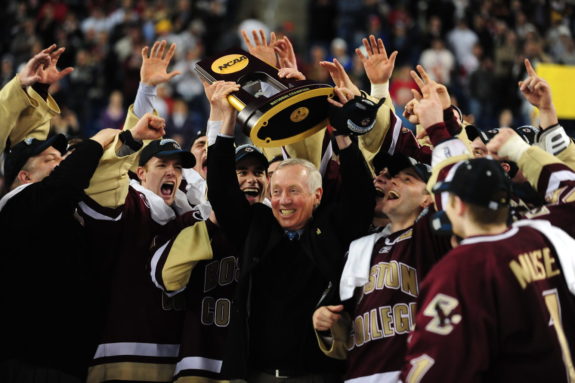
Boston College’s conference championship earned them a spot in the national tournament. After beating Minnesota in the opening round, the Eagles then took down no. 2 Miami to make it back to the Frozen Four. A convincing win over North Dakota sent BC back to the final, this time taking on Notre Dame.
The game proved to be fairly tight, but the Eagles converted on their chances. A pair of goals from Gerbe in the second period helped send the Eagles on their way to a 4-1 win, and the team’s second championship of the decade.
2009: Boston University
Since losing in the 1997 National Championship Game, the Boston Terriers had only won three games in the national tournament, never making it back to the Frozen Four, including missing out on the tournament entirely in 1999, 2001, 2004 and 2008.
However, the stars seemed to align for Boston during the 2008-09 season. They were consistently one of the best teams throughout the regular season, finishing ranked No. 1 in the country with a 27-6-4 record. The team had a dynamic blueline, led by All-American Kevin Shattenkirk and Hobey Baker-winner Matt Gilroy. Offensively, the Terriers were led by All-American Colin Wilson and Nick Bonino. Wilson’s 55 points were the second-most in the country that season, with Bonino’s 50 tied for fourth in the NCAA.
Following the Terriers’ seventh Hockey East Championship, they were able to slide past Ohio State and New Hampshire in the Northeast Regional to make it to the Frozen Four. After a wild shootout against conference foe Vermont in the semifinal, Boston would meet Miami in the championship game.
The Terriers scored first, but three straight tallies from the RedHawks seemed to have to put the game out of reach heading into the final minute of the contest. Miraculously, the Terriers mounted a comeback with the net empty, goals from Zach Cohen and Bonino sent the game to overtime. Just a few minutes into the extra frame, tournament MOP Colby Cohen took a shot that deflected off Miami’s Kevin Roeder, up and over goaltender Cody Reichard’s shoulder and in to win Boston their first championship since 1995.
The 2000s were an exciting time for college hockey. More eyes were on the sport than ever before, and we saw some of the most exciting action to boot. The talent was getting better as well, with more and more players making an immediate impact in the NHL. The play would only get better heading into the second deacde of the century.